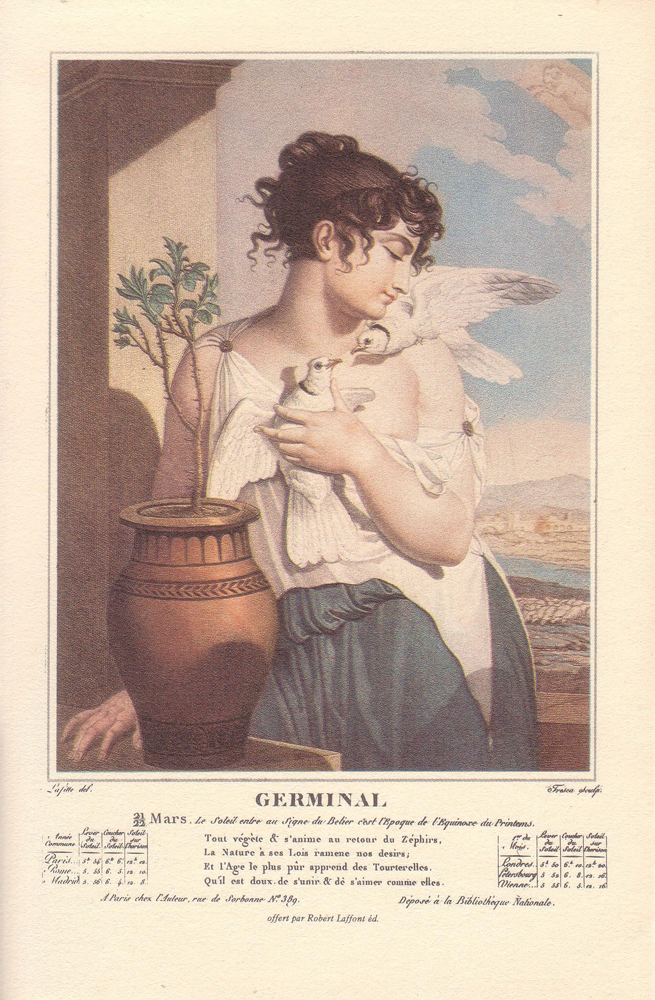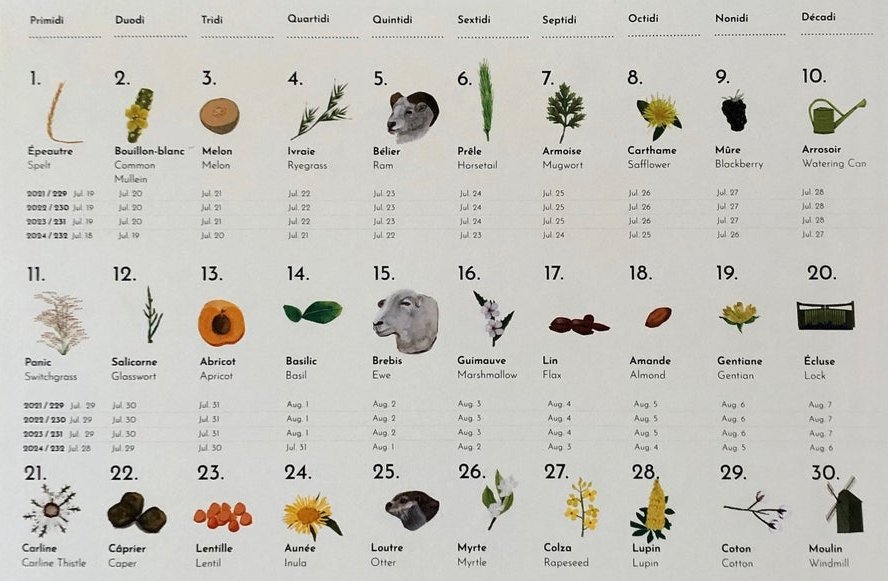Posted 2020-09-26
On Calendar Reform
Let’s face it: the Gregorian calendar is a mess. There are a serious number of problems with it, but let’s list just a few:
- Months have different numbers of days. This not only means that school children have to rote-learn mnemonics for which months have thirty days (“thirty days have September, April, June…”), but that we can’t use a month as a unit of time, in any practical way. The number of periodicals, services, and so on which renew every 30 days is a testament to the instability of the month. Despite the predictable regularity of the moon’s phases, we can’t rely on the calendar month.
- Each year is different. We have to print new calendars for each year, since they don’t always start on the same day of the week. That also means that we can’t have holidays on the same dates every year. If your holiday has a prescribed date, like Halloween, then you have to resign yourself to the possibility that it falls on a Monday. Sure you can celebrate it on the Saturday before, but do you see what kind of a mess we’re getting into? The alternative isn’t great, either: President’s Day is the third Monday of February, which means it’s anywhere from the 15th to the 21st, and it’s something you have to figure out each year. Wouldn’t it be great if we could have a single calendar, and use it every year?
- The names for the months are nonsensical. Even if you don’t object to months named after the Greco-Roman gods Janus, Mars, Aphrodite, Maia, and so on, and even if you don’t mind that Julius and Augustus Caesar added their own names to this pantheon, you’ll admit that it just gets insane in the last part of the year. September made sense when it was the seventh month (sept- is seven in Latin), October the eighth month, and so on. But to have months named for numbers, and have those numbers be off by two, is just ridiculous.
- There are too many concurrent systems. The Gregorian calendar is a lunar and solar calendar, with weeks thrown on top. That’s just too many systems. The year takes its cues from the seasons, and from the rotation of the earth around the sun. But the month is modeled after lunar calendars, which don’t align with the solar. A lunar year is about eleven days shorter than a solar year. And suddenly, player three enters the game: weeks, which aren’t aligned with anything astronomical, and just keep track of seven named days over and over. Weeks aren’t aligned with months or years, either, so months start on different days of the week, and months have different numbers of weeks.
The amazing part is: we’ve known all this about the calendar, for centuries. Every so often, someone appears and proposes an improvement. We don’t seem to listen to them. But we should.
Here are a few of my favorite calendar reform ideas. All of these are improvements over our Gregorian calendar.
The French Republican Calendar
One of the more valiant efforts at calendar reform came during the French revolution. The révolutionnaires, in an effort to consciously rebuild the country, rewrote the calendar from scratch, and they mitigated, if not solved, many of the above problems. Here are some of the French Republican Calendar’s best features:
- Each month has thirty days, and begins at the beginning of the week.
- The week (decadi) is ten days long. There are three weeks in a month.
- To solve the leap-day problem, there are five extra days—all holidays!—with names like La Fête du Génie, “Celebration of Talent”, and La Fête de l’Opinion, “Celebration of Convictions.” These all fall towards the end of the summer.
- The months have poetic names, named after meteorological or agricultural cycles. Germinal, is a month of germinating. Thermidor is the month of heat. Floréál is the month of flowers.
- Best of all, each day gets a name. So instead of “July 31st,” it’s abricot, or apricot. “Why don’t we grab a coffee on Apricot Day?” sounds so much nicer than “Why don’t we grab a coffee on July 31st?”. Furthermore, since each quintidi rest day is an animal, and each décadi is some kind of object or agricultural tool, you know what day of the week it is already. You don’t have to think, “July 31st, is that a Saturday?”


The Positivist Calendar
Proposed by August Compte, in 1849, this calendar has 13 months of 28 days each, and a festival day each month, which was its own day of the week (that is, outside the week system). That allowed each month to start on the same day (Monday). The names are a little too worshipey for my taste, although they’re still a big improvement over Gregorian month names. They are: Moses, Homer, Aristotle, Archimedes, Caesar, Saint Paul, Charlemagne, Dante, Gutenberg, Shakespeare, Descartes, Frederick, Bichat.
This is a very male-heavy list of figures, but it’s still nice to see months named after poets, literary figures, and mathematicians. However, it’s a little ironic that Caesar is still in this calendar, but with a different name.
The Hanke-Henry Permanent Calendar
Designed in the early 2000s decade by two astronomers at Johns Hopkins, the Hanke-Henry Permanent Calendar is called “permanent” because its dates always have the same week days, making it so you wouldn’t need a new calendar every year. Every six or so years there is a leap week called “extra,” as in the French Republican calendar. But the days still vary, month to month: March, June, September, and December have thirty-one days, and the rest have thirty. This is still an improvement over the Gregorian calendar, however.
The ISO Week-Date Calendar
This calendar, which is part of the ISO 8601 standard for dates and times, dispenses with months altogether, and just uses numbered weeks. The more you think about it, the more this is appealing. Consider the way we normally have to convert months into weeks, anyway: “please allow 6-8 weeks for shipping” is a common expression that could be converted to months, but isn’t. Consider the way we currently have to talk about a certain week, like “the first full week in February.” That’s a lot of words for saying what we could say with something like “week 5.” Thee week-date calendar fixes that.
The problem is the way we’ve chosen to superimpose the two incongruous systems of weeks and months. So why don’t we just pick one and stick to it? We can’t really get rid of weeks, since they determine when we work and when we rest. And we wouldn’t really lose anything by scrapping months, and leaning into weeks.
Today’s date (September 26th, 2020) in the week-date calendar looks like this: 2020-W39-6. That’s 2020 (the year), week number 39 (the fourth week in September), and the weekday number (6, Saturday). Colloquially, I imagine one might say, “Friday, week 39,” as in, “I can’t meet this week, or next, but how about Friday, week 39?”.
The only disadvantage, as I see it, is that this just doesn’t sound as elegant as saying “September 26th.” It’s nice to have names for things. They’re a little nicer than numbers.
A Proposal for a New Calendar System
Why not combine the best features of the calendar reforms above? My favorites of the above calendars are the ISO week-date, for its simplicity of only weeks, and the French revolutionary calendar, in that it has memorable poetic names for dates. One criticism of the named months, though, was that they’re very specific to Parisian seasons. It doesn’t snow very often in Marseille. And harvests take place at different times, depending on the latitude. If you included French colonies and territories in tropical climates, a month name like nivose (snowy) would seem almost insulting.
Week Names
Here are some example week names for my home town, New York City. They’re based on weather, holidays, annual traditions, and so on.
- party
- sidewalk trees
- gray skies
- endings
- doldrums
- snowy
- paper hearts
- presidents
- windy
- coyote
- sleepy (Daylight Savings)
- shamrock
- bear
- melting
- showers
- taxes
- cherry blossoms
- deer
- flowers
- park-picnics
- mermaid
- Coney
- Rockaway
- sandy feet
- Cyclone
- rooftop
- barbecue
- tank top
- sweaty
- sunscreen
- Hell’s kitchen
- Shakespeare
- weddings
- Battery Park
- white clothes
- labor
- dark clothes
- honey locust
- pumpkin spice
- actual pumpkins
- flannel
- snow, once
- squirrels
- scary
- election
- yellow gingko
- thanks
- foggy
- dark
- cold
- tree-lighting
- pine trees
- jingles
Help me out in the comments. What would be your local week names?